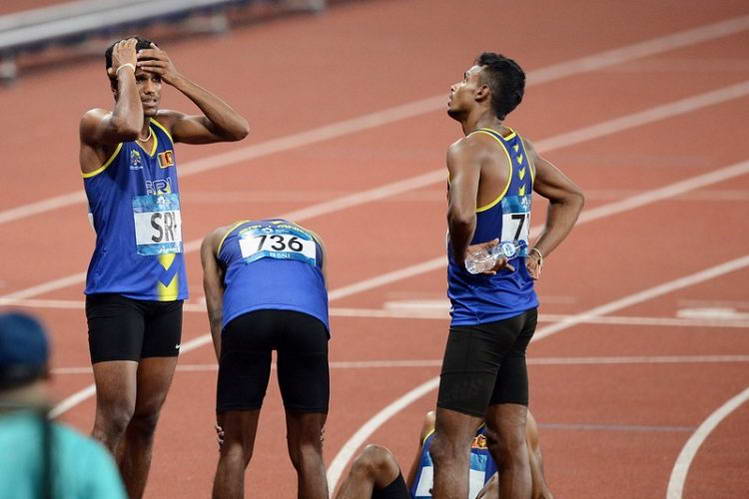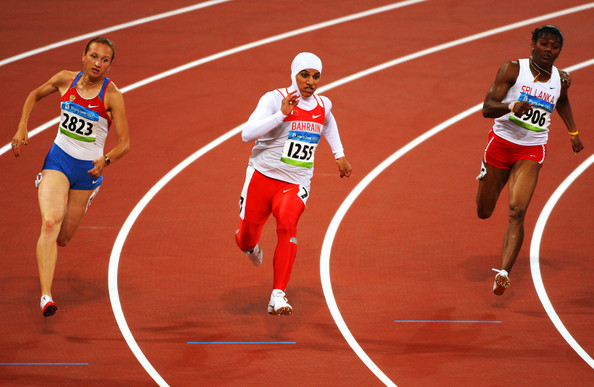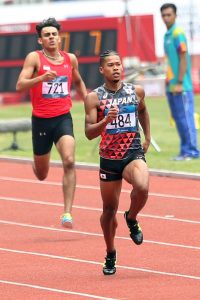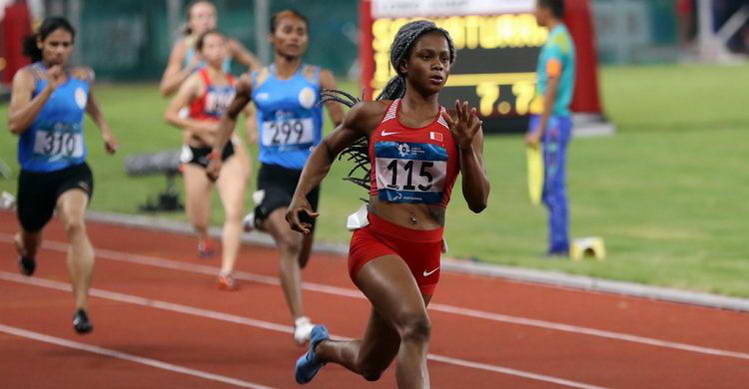Asian Games Athletes : Were they really Asians?
- 16 gold medals were won by Africans
- India alone lost 7 gold medals to Africans
- IAAF New laws introduced to control transfers
- Japan finds new trick for sprinters
- The Asian Games Athletic Championship ended with both China and Bahrain collecting 12 Gold medals each. But none of the Bahrainis golds were actually won by Asian athletes.
- List of selected Asian Gold medalists and their original countries
Event Name Representing From 400M Abdalelah Haroun Qatar Sudan 5000m Birhanu Balew Bahrain Ethiopia 10000m Hassan Chani Bahrain Morocco 400m hurdle Abderrahman samba Qatar Mauritania Hammer Throw Ashraf El Seify Qatar Egypt 100M Eddiong Odiong Bahrain Nigeria 200m Eddiong Odiong Bahrain Nigeria 400m Salwa Eid Naser Bahrain Nigeria 1500m Kalkidan Gezahegne Bahrain Ethiopia 5000M Kalkidan Gezahegne Bahrain Ethiopia 400M hurdle Oluwakemi Adekoya Bahrain Nigeria 3000M St.Ch Winfred Yavi Bahrain Kenya Marathon Rose Chelimo Bahrain Kenya 4x100m Women Team Bahrain team Bahrain Only one athlete was from Bahrain 4x400m Men Team Qatar team Qatar None of them were from Bahrain 4x400m mix relay team Bahrain team Bahrain None of them were from Bahrain As Ceylon Athletics earlier highlighted on numerous occasions it was the African athlete who once again rocked the show at the Asian Games, just as they did during the last edition, and many other Asian level championships and it affects regional athletics a lot, both in good and bad ways.
16 golds for Africans
There were 16 Gold medals including three relays that were won by these athletes hired by Qatar and Bahrain, medals which would have been won by other native Asian athletes. And it would have made huge difference to the medal tally at the Asian Games. It was ironic, that some of the athletes who were celebrating with the Bahraini flags after winning gold medals were not from Bahrain; three of them were from Nigeria with another from Morocco. And once the National anthem was heard during the medal ceremony, none of them knew it nor were they able to at least mimic it.
India alone lost 7 Gold medals to these foreign athletes and if not for them India would have topped the athletics medal tally at the Games. Sri Lanka too lost their only possible medal in the men’s 4x400m relay at the Games due to these African athletes of Qatar who won the four gold medals as Sri Lanka finished fourth.

- Transferring allegiance
Transferring allegiance to another country by athletes has been happening for a long time it was permitted for athletes to have better facilities to compete at world level. This made it possible for them to get better facilities, from somewhere else other than from their native country, where it was not possible.
But wealthy Middle Eastern countries and even some European countries used the opportunity to form formidable athletic teams by allegiance transfers. Most talented African athletes used the opportunity as an instrument for money making.
At international level championships it did not matter where the athlete came from, as only the best was going to win, despite their region or the country. But, when it was a regional championship such as Asian Games or the European Championship it made a huge difference.
According to the IAAF rule, an athlete opting to transfer allegiance, from his native to another, had to remain in a country for three years before representing it. Yet, the IAAF had made it possible for athletes to make the transfer and represent another country within a year, if the Athletics Association of the nation where the athletes come from, gave their consent.
Middle East, especially Bahrain and Qatar seems to get that consent a lot from African countries and this involves large sums of money for these transactions, with, such Athletics Associations of those countries, as well as for athletes’ and their families.
Hiring athletes at a young age
And, after growing concerns over transfers, Qatar and Bahrain now adopt a new method, to hire athletes at a young age from African countries before they even represent their countries, where Bahrain started wining even World Youth (U-18) gold medals with such athletes. And, with most African athletes being known for making false documents about their age, there has been a growing concern about the real ages of athletes when it came to youth and junior championships.
Also, there’s a practice of changing the athletes’ names during transfers to Arabic names, by these Middle Eastern countries which makes it hard to dig up the past records of these athletes.
Legend of Al-Ghasra

- Bahrain has been a country which revolutionized the female athletics in the Middle East, when their own Ruqaya Al-Ghasra won the Asian Games gold beating the Olympic medalist Susanthika Jayasinghe in 2006 and represented Olympics. Ghasra, ran wearing the Hijab and a full body covering running kit, keeping with the Middle Eastern religious traditions/requirements. But, following the retirement of Al-Ghasra, Bahraini female athletics was largely dominated by African athletes, leaving no space for another Al Ghasra to come up. The hiring of athletes, had resulted in somewhat of a decrease in the interest and the talents of the native athletes, in those countries as they hardly got the chance to represent their country due to Africans.
Second generation
These hiring’s have also, resulted their second generations arriving in the Middle East mow. For example the Qatari star high jumper Mutaz Essa Barshim, the Olympics and World Championship medalist was born to a Sudanese family living in Qatar and his father was one of the hired athletes, Qatar got from Sudan, who later decided to settle down in Qatar and start coaching.
Japanese new found sprinter from Jamaica
Japan also, seems to have found a new trick of finding world class sprinters, as their two of the prime sprinters are born to Japanese mothers and Jamaican fathers. Aska Cambridge, who anchored Japan to a gold medal at the Asian Games 4x100m relay, according his biography, says he was born to a Jamaican father and Japanese mother in Jamaica and moved to Japan as a toddler. Aska was a member of the Japanese Olympic silver medal winning 4x100m relay team at the Rio Olympic Games.
 The 400m runner Julian Walsh who finished fourth in the individual 400m and represented the bronze medal winning 4x400m Japanese team, has a similar biography where he too was born to a Japanese mother by a Jamaican father in Jamaica and moved to Japan as a toddler.
The 400m runner Julian Walsh who finished fourth in the individual 400m and represented the bronze medal winning 4x400m Japanese team, has a similar biography where he too was born to a Japanese mother by a Jamaican father in Jamaica and moved to Japan as a toddler.
After several complaints, from countries about the said issue, the IAAF froze the transfers in February but did reinitiate it in July 2018 ahead of the regional championships such as the Asian Games. By August of 2017 there was a total of 53 athletes, transferred to Qatar and Bahrain since 2013. And, how many transfers were allowed after reinitiating the transfer process in July is yet to be seen, as the IAAF has not yet released the 2018’s, allegiance transfer list yet .
Good for Asian performances?
On the other hand, these athletes have been the result in the increase in the competition and performance levels in Asia so drastically where athletes from Asia have been forced to push their limits, at least to win an Asian level championship due to the transferees.
A prime example is the Chinese sprinter Su Bingtain, running 9.92 seconds to win the 100m beating Qatar’s Nigerian sprinter Tosin Ogunode. The Asian 100m that was being won for times above 10 seconds, was changed by Qatar’s hired sprinter Samuel Francis, which pushed the Asian Athletes to go below the 10 seconds barrier.
Similarly, India managed to beat the star trodden 4x400m women’s relay team from Bahrain that included World Championship silver medalist and Asian record holder Salwa Eid Naser and 2014 Asian Games 400m gold medalist and former Asian 400m record holder Oluwakemi Adekoya.
The presence of African athletes also helped Asian Athletes to perform well internationally. And, the gap between the Asian level and the world level has been closing up day by day.
Also, on the point of athletes, the African athletes who are talented but lack facilities in their countries get the best of facilities, payments and coaching in Qatar and Bahrain, to improve their performances and there have also been world champions emerging from country’s like Bahrain.
New rules
Nevertheless, the new rules of the IAAF rules, that have been put forward adds more balance to the equation and includes the following points
- A minimum three-year waiting period before an athlete may transfer to represent another member
- Establishment of a review panel to make determinations on the credibility of applications
- The provision of evidence that countries are offering full citizenship and associated rights
- The provision that an athlete can transfer only once
- That no transfers take place before the age of 20.



